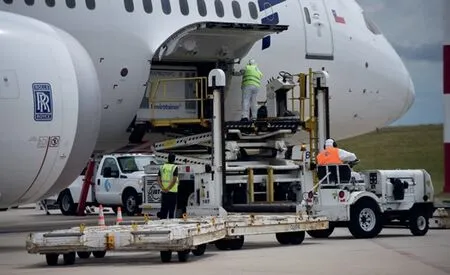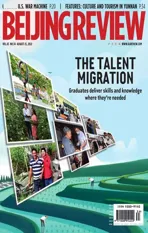Trade Deal in the Pipeline
2022-08-24

China and Uruguay have just concluded a study on the feasibility of a free trade agreement (FTA)between the two countries. In an interview with Michael Zárate, Associate Executive Editor of, a Spanish monthly published by China International Communications Group Center for the Americas, Uruguayan Ambassador to China Fernando Lugris talked about the FTA as well as other recent developments in the bilateral relationship. Edited excerpts of their conversation follow:
During the recent Southern Common Market (Mercosur) Summit, one of the topics on the table was the FTA Uruguay aspires to sign with China. Why is the signing of this agreement important?
Fernando Lugris: Since the beginning of his administration in March 2020, President Luis Lacalle Pou has emphasized the importance of Uruguay opening up to the world to achieve greater prosperity. In their almost 35 years of friendship, Uruguay and China have established a mature economic and trade relationship based on a sincere political dialogue between their leaders. All Uruguayan presidents during this time have visited China and reaffirmed the basic principles of the bilateral relationship, such as the one-China principle based on the UN General Assembly Resolution 2758 of 1971.
China has been Uruguay’s main trading partner for almost a decade. As a result,in September 2021, we proposed to begin negotiations for a bilateral FTA. On July 13,President Lacalle Pou announced the favorable conclusion of the study, referring to the opportunities a future FTA with China represents for the development of different productive sectors in Uruguay, such as raw materials, industry and technology.
In short, an FTA with China is expected to contribute significantly to Uruguay’s economic development by improving the conditions under which bilateral trade and investment take place.
Are you confident the Mercosur members will be able to reach an agreement on an FTA with China?Uruguay has always upheld that it is the best option to move forward that all Mercosur member states jointly negotiate an FTA with a non-regional country. In the case of China, however, this negotiation arrangement has not been feasible for different reasons. Even so,Uruguay has always been an active promoter of joint negotiations.
As of today, Uruguay is the only Mercosur state party with a mandate to negotiate an FTA with China.
At the Summit of Mercosur Heads of State in Paraguay on July 21, President Lacalle Pou reiterated that Uruguay will keep the other states informed on the progress of the upcoming talks with China,expecting other members of the bloc to join the negotiations at some point.
A delegation headed by Cai Wei, Director General of the Department of Latin American and Caribbean Affairs of the Chinese Ministry of Foreign Affairs, visited Uruguay in late July. What do you make of this visit?
The visit was of special significance because it marked the first time for a Chinese government delegation to visit the Southern Cone since the onset of the COVID-19 pandemic.Director General Cai had a very busy schedule of meetings while in Uruguay.
During the meeting with Minister of Foreign Affairs Francisco Bustillo, all issues related to the bilateral relationship were analyzed, as well as the international scenario as a whole. The possibility of reaching an FTA between both nations was also part of that dialogue.
The year 2023 will mark the 35th anniversary of the establishment of diplomatic relations between Uruguay and China,demonstrating the solid framework that is testament to the strength and growth of the ties between the two countries.
Foreign Minister Bustillo and Director General Cai spoke highly of the current level of bilateral trade and agreed there is still ample room for growth. Another topic that was part of the conversation concerned cooperation, which proved its importance and strength during the difficult times posed by the pandemic.
Uruguay was the first Mercosur country to join the Belt and Road Initiative in August 2018. What is the Uruguayan Government’s view of the initiative and how does it tie into Uruguay’s own development strategy?

Workers unload containers transporting China-made COVID-19 vaccines at an airport in Montevideo, Uruguay, on March 16, 2021
The Belt and Road Initiative is an invitation to jointly build a global strategy based on the principles of free trade and improved connectivity, as well as both physical and digital infrastructure. Uruguay values being able to participate—from its own perspective on sustainable development—in this global initiative. This is the reason why it joined early on, making it the first Mercosur country to do so. Likewise, there is a coincidence between the goals of President Lacalle Pou’s government regarding the country’s development and those of this initiative. Uruguay supports free trade and economic liberalization as pillars of its national development strategy.
The Uruguayan Government, while seeking to expand the country’s network of trade agreements with the rest of the world, is also launching an ambitious plan for both physical and digital infrastructure. Some of the major projects currently underway include the participation of Chinese companies in sectors related to energy and infrastructural connectivity.
Let me cite two recent examples: China Machinery Engineering Corp.’s collaboration with Uruguay’s main energy provider in an undertaking which constitutes our country’s most important investment project; and the recent opening of a maritime cargo transport line between Uruguay and Argentina using a modern China-built ship. While we could list still more projects,the important thing to note is that Foreign Minister Bustillo is ready to travel to China for the signing of an action plan for Belt and Road cooperation, which will present many more concrete projects in multiple strategic areas.
Five years ago, as ambassador of Uruguay,you witnessed the 19th National Congress of the Communist Party of China (CPC). What are your expectations for the upcoming 20th CPC National Congress?
The 20th CPC National Congress will be a valuable opportunity to learn more about the main guidelines that will steer China in the next five years. I will be paying close attention to China’s foreign policies. It will be of special interest to familiarize myself with the Party’s principles on developing China’s relations with other developing countries in the framework of the increasingly relevant South-South cooperation. BR
